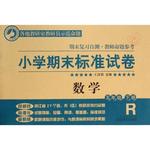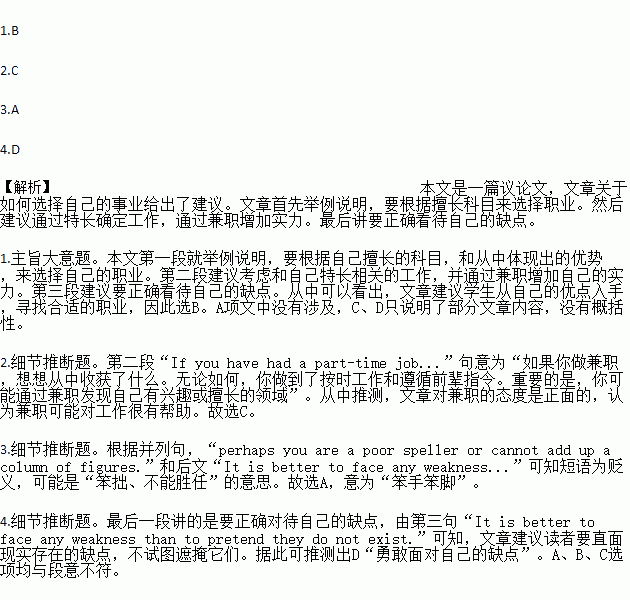题目内容
What should you think about when trying to find your career?You are probably better at some school subjects than others.These may show the strengths that you can use in your work.A boy who is good at mathematics can use that in an engineering career. A girl who spells well and likes English may be good at office work.So it is important to know the subjects you do well in at school.On the other hand,you may not have any specially strong subjects but your records show a general satisfactory standard.Although not all subjects can be used directly in a job,they may have indirect value.A knowledge of history is not required for most jobs but if history is one of your good subjects you will have learned to remember facts and details.This is an ability that can be useful in many jobs.
Your school may have taught you skills,such as typing or technical drawing,which you can use in your work.You may be good at metalwork or cookery and look for a job where you can improve these skills.If you have had a part?time job on Saturdays or in the summer,think what you gained from it.If nothing else,you may have learned how to get to work on time,to follow instructions and to get on with older workers.You may have learned to give correct change in a shop,for example.Just as important,you may become interested in a particular industry or career you see from the inside in a part?time job.
Facing your weak points is also part of knowing yourself.You may be_ all_ thumbs when you handle tools;perhaps you are a poor speller or cannot add up a column of figures.It is better to face any weakness than to pretend they do not exist.Your school record,for instance,may not be too good,yet it is an important part of your background. You should not be apologetic(认错的)about it but instead recognize that you will have a chance of a fresh start at work.
1.What is the passage mainly about?
A. The importance of working hard at school.
B. Choosing a career according to one's strengths.
C. How to face one's weakness.
D. The value of school work.
2.According to the passage,doing a part?time job for a student is probably ______.
A. a good way to find out his weak points
B. one of the best ways of earning extra money
C. of great use for his work in the future
D. a waste of time he could have spent on study
3.The underlined phrase “be all thumbs”(in Para.3)probably means “______”.
A. be clumsy at doing things B. be skillful in doing things
C. be not interested in certain things D. be ea sily bored in doing things
sily bored in doing things
4.From the last paragraph we know one should ______.
A. make full use of one's own weak points B. study harder for a new school record
C. apologize for one's own school record D. face one's own weak points bravely
 小学期末标准试卷系列答案
小学期末标准试卷系列答案What is waste and why does it matter?
Waste or rubbish is something that people throw away because they no longer need it or want it. Almost everything we do creates waste and as a society we are currently producing more waste than ever before. We do this at home and at work. The fact that we produce waste, and get rid of it, matters for the following reasons.
When something is thrown away we lose the natural resources, the energy and the time which have been used to make the product. The vast majority of resources that we use in manufacturing products and providing services cannot be replaced. The use of these resources cannot go on indefinitely— we would run out.
When something is thrown away, we are putting pressure on the environment's ability to cope— in terms of the additional environmental impacts associated with extracting the new resources, manufacturing and distributing the goods, and in terms of the environmental impacts associated with getting rid of our rubbish.
When something is thrown away, we are not able to see it as a resource. It is well understood that what is waste to one person may not be viewed as waste by another. A good example of this is scrap metal(金属废料)which has been recycled for many years. Increasingly people are realizing that it makes economic sense as well as environmental sense to use "waste" rather than just throw it away.
The process of using up the earth's natural resources to make products which we then throw away, sometimes a very short time later, is not "sustainable" — in other words, it cannot continue indefinitely.
The way we consume materials will affect whether we have a sustainable society that leaves resources available for future generations to use. As consumers and producers, we are central to the concept of sustainability. We need to think about how we can get more out of less, how we can use less and throw away less and how we can do better things with our so-called "waste" than throw it away. We need to see "waste" as a "resource".
Title | The problem with waste |
1. | Waste or rubbish is what people throw away when they do not need it or want it any longer. |
Important 2.on society | The natural resources, the energy and the time used to make the product become 3.when something is thrown away. The vast majority of resources can’t be replaced and they would be 4.up. The environment's ability to extract the new resources, manufacture and distribute the goods and get rid of rubbish is 5. pressure. People 6. to see it as a resource. Increasingly, people are realizing that it makes both economic sense and environmental sense to use "waste" 7.of just throwing it away. |
Result | We’ll leave fewer resources 8. for future generations to use. |
9. | People should have the 10. of sustainability, thinking about getting more out of less, using less, throwing less and doing better things with it. People should see "waste" as a "resource". |

